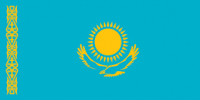Kazakhstan: Russian Exodus Continues Unabated
Rédigé par manager - - aucun commentaire
The runner-up destinations for those leaving the country in 2015 were Germany (2,000 people), Belarus (605), Uzbekistan (364) and the United States (265).
Analysts see a raft of reasons for this exodus, ranging from the country’s economic prospects, the uncertain outcome of future political transition and a purported uptick in Russophobic sentiments.
Political analyst Maksim Kramarenko suggested to Exclusive.kz that migration of ethnic Russians reflects a process of communities “choosing their identity” — going to live in a country where they feel they belong.
A recently adopted initiative by the Education Ministry to introduce trilingualism into schools (Kazakh, Russian and English) has caused much upset among parents.
“Teaching in three languages can negatively affect the educational process,” Kramarenko said. “This is initiative is forcing many Russians to think about the future of their children and about how to preserve their ethnic and cultural essence, how to get a quality education in their native Russian language.”
Many of those leaving the country are well-educated and highly skilled and fear for their potential to succeed in Kazakhstan.
The most potentially noxious root cause for people to leave, however, is a perceived sense of latent tension among Kazakhstan’s numerous ethnic groups. President Nursultan Nazarbayev has made the cultivation of harmonious relations among the country’s ethnic communities a core tenet of his 25 years ruling over an independent Kazakhstan, but there are concerns the impact of this message may be failing to sink beneath the surface.
Sociologist Gulmira Ileuova said in an interview to regnum.ru that what are perceived as nationalist tendencies are often manifested in the labor markets. Companies employing overwhelmingly or completely mono-ethnic workforces compound the impression that some areas of unemployment are closed off to minority communities.
“One of the main reasons [for the exodus] shown in studies has been the rise of day-to-day nationalism and the perception of the spread of the state language [Kazakh] as a form of discrimination,” Ileuova said. “It is hard to define day-to-day nationalism. For some it is a matter of concrete occurrences, like when they do not get a job because of their ethnic origins. For others it might be that they are not given a seat on the bus or somebody looks at them in a funny way.”
Marina Pusteko, a consular worker for the Russian Embassy in Kazakhstan whose work is focused on her government’s voluntary migration program, told Arvedi.kz, a website devoted to the Russian community in Kazakhstan, that a leading factor is the decline of the Russian language in Kazakhstan.
“People are scared that the younger generations are unable to protect their Russian culture and language. Many Russian speakers now have trouble getting jobs where knowledge of the state language is a requirement. Lots of factors are mentioned, but this is the one that dominates,” Pustenko said.
Kazakhstan indeed continues to struggle to persuade its Slavic minorities to adopt the usage of Kazakh, although there is some anecdotal evidence that fluency in the language is spreading among children. Older Russians have by and large tended to eschew learning a language that was certainly of little official use in Soviet times.
Nazarbayev’s own messages on language are themselves sometimes contradictory and have on occasion offended proud Kazakh speakers.
In February, he made a speech in which he suggested that officials who answer in Kazakh to people speaking in Russian should be summarily dismissed.
The negative popular reaction to this statement required an exercise in damage limitation by Nazarbayev’s press secretary, Dauren Abayev, who has since been appointed head of the newly created Information and Communications Ministry. Abayev explained away the remarks by stating that the law requires officials to respond to queries in one of the official languages in which they have been addressed.
Such legalities will likely be far from enough to reassure the shrinking Russian community, however.
Commentaire de RSAC : A l'instar de l'article précédent, l'émigration russe du Kazakhstan et les discriminations réelles et/ou fantasmées qui les touchent, sont peu connues du public occidental.
Copyright ©EURASIANET - Mots clés : aucun
